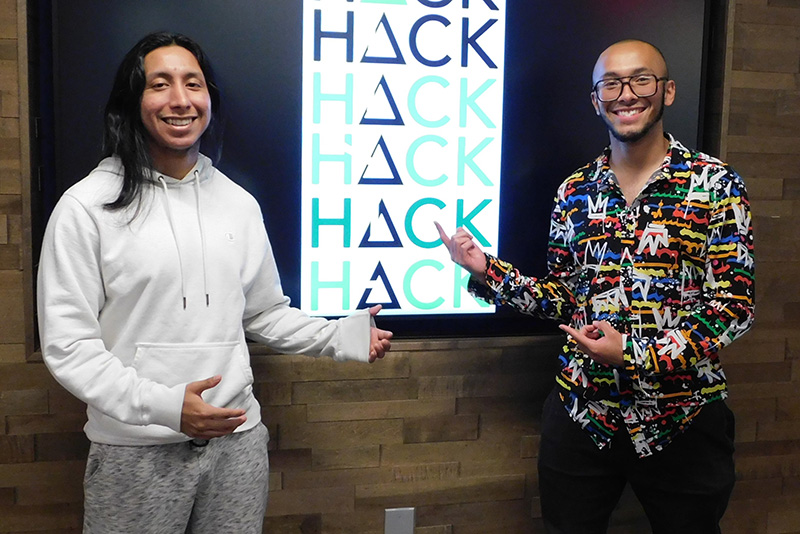- Apply
- Visit
- Request Info
- Give



Published on September 21, 2023

Brainstorming paid off for Eastern Connecticut State University computer science students Ian Valeta and Diego Hernandez Ramirez when their plan for a tree-planting digital game won them the top prize at the Hack4Delta Sustainability Hackathon Sept. 15-17 in Hartford.
Their project beat plans presented by teams from schools such as Yale, UConn, Trinity and others. They developed the game over a hectic 24 hours that had them pulling an all-nighter and finishing with a “mad dash to create our presentation, finalize our gameplay demo and get the front-end software to work with the back-end software,” as Valeta described it.
The Eastern team was third in line to demonstrate their project. “When the applause for the second team started, my heart was jumping a mile a minute,” Valeta said.
“The mentors rounded us up after 30 minutes of intense anticipation and called third-, second- and first-place winners. I had no idea what to expect, but when they said we were the winners, I was in shock,” Valeta said.
It was the first hackathon, or coding and creating event, for both students. They brainstormed their final plan during a car ride into Hartford after first considering other preliminary plans.
What they came up with was a mobile application game about digitally chopping down trees with an ax, an action that connects players with a nonprofit, Digital Humani, that, in turn, links donors with reforestation projects.
“Combining an in-app purchase business model of mobile gaming, a secure electronic payment API (Square) and a digital reforestation service API (Digital Humani) brought attention to deforestation with a real, tangible action to plant trees, taking a digital solution to the real world,” said Jazna Stannard, co-founder of Hack4Delta, which sponsored the hackathon.
“For example, a user purchases 100 virtual credits for $10. We can set 90% of the revenue to be sent to a reforestation service,” said Hernandez Ramirez. “This reforestation service (Digital Humani) will plant one tree for $1. So for that user transaction, nine trees will be planted,” he said.
The students wanted to leverage consumer actions and existing services to make consumers engage in sustainable actions more frequently, he said.
The students can release the backend infrastructure of their app to the open-source developer community to allow anyone to improve on their solution or integrate it into their own mobile apps, said Hernandez Rodriguez, “increasing the adoptability of the reforestation-focused virtual credits system.”
“This scalability and simplicity of the design really allowed us to stand out from the competition,” said Valeta. Working so hard and fast on the design, including the all-nighter, enabled them to build comradery with the other teams, who were also hard at work. “I would go from one end of the building to the other, asking the other teams to playtest my game and to also give them feedback on their projects,” he said.
“I was just so grateful for my advisor Dr. Dancik for reaching out to me for the opportunity to participate and grateful for the judges believing in our quirky idea,” he said.
“Needless to say, I am extremely proud of our students, Ian and Diego, for their hard work, creativity and resolve in competing with 17 teams and winning this competition,” said Professor Garrett Dancik, computer science department chair. “Their success is a perfect encapsulation of what we hope to accomplish in computer science at Eastern, which is to provide students with technical computer science skills with a liberal arts foundation to prepare them to engage with and find solutions for difficult problems, such as those involving sustainability,” he said.
S. Tazeem Fatima, a new adjunct professor of Business Information Systems, was a mentor for the hackathon, where she first met the Eastern team.
"I met these two very energetic young minds at the competition. They had a couple of brilliant ideas but the game play around the sustainability theme sounded so good," she said. "I am so glad they chose to go with that and made magic happen over the weekend. They had some really tough competition. But all four judges had the same comments: The solution is simple, appeals to the audience and will be the quickest to scale at the lowest cost."
She suggested that the two students could be mentored more in their venture by faculty in computer science and business, and that the students might form a company using their code.
Both students are juniors majoring in computer science. Hernandez Ramirez also works remotely as a software developer at a web3 social media startup. Valeta minors in business analytics and studio art.
Written by Lucinda Weiss